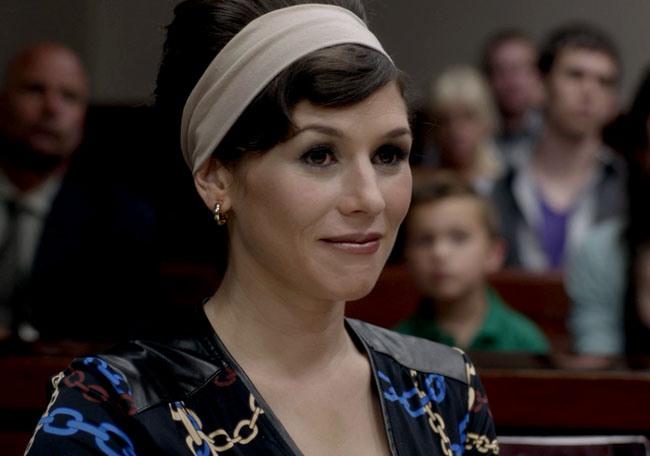Until the fourth episode of Season 2 of Orange Is the New Black, the character Lorna Morello (Yael Stone) was most distinguished by her voice. A little bit Boston, a little bit New Jersey, a little bit mobster, and a little bit mouse, Morello’s voice lit up her scenes. A universally adored—or at least tolerated—inmate, the most dangerous thing Morello did was dab on a little contraband lipstick. She was completely innocuous. Until she wasn’t.
Orange Is the New Black doesn’t skimp on its full and complex female characters. They take turns stealing the show, sashaying in and out of focus, and often in and out of favor. But Morello emerged this season as one of the most troubled and troubling characters on a series full of them.
When we first meet Morello, she’s in the driver’s seat of the prison van doing the two things she does best: reassuring new inmates that they’re going to be OK and flipping through a wedding magazine. We soon learn that she’s a hopeless romantic lovesick for her fiancé “Chris-tah-fuh,” who, she assures those who doubt that an engagement can survive prison, is going to wait for her. She’s not exactly waiting for him, though, at least at first: She bides her time in the shower with Nicky Nichols (Natasha Lyonne) until deciding that their fling is unfair to her betrothed.
We get hints, mostly in the form of references to Christopher’s new girlfriend, that Morello’s wedding obsession is perhaps more fantastical than she lets on. But when we see her backstory, those hints crystallize into a 14-carat epiphany: Morello’s not just lovesick. She’s an unhealthily obsessed stalker with violent tendencies living in a world of delusions. And none of her fellow inmates have a clue.
This behavior makes sense in the context of her home life, which is full of responsibilities she’s unequipped—or perhaps unwilling—to handle. Her mother is ill and requires constant care. The men of the house sit around watching sports while Morello’s sister folds laundry, her baby playing with a box of cigarettes. She escapes the incessant noise by going to see Twilight in the middle of the day and buying designer clothes through a mail scam, requesting refunds when the clothes mysteriously fail (so she claims) to be delivered. Her bedroom is a collage-filled, teenaged refuge. In fact, all her escapes suggest that her mind is stuck in adolescence.
When her sister asks Morello to answer their mother’s ringing bell, she responds, “What am I, Cinderella?” But within the fairytale narrative she imposes on the world, that’s exactly who she is. And when she crashes into Christopher at the post office, she’s certain that this is her Notting Hill–style rendezvous with Prince Charming. When happily-ever-after doesn’t ensue, she stalks him, crashes his romantic getaway with another woman, threatens his life, and attaches a homemade bomb to the underside of his new fiancé’s car.
Morello’s delusions constitute a major mental-health problem that requires psychological help—help she’s not likely to get in prison. She fits the description of “the intimacy seeker,” one of five subtypes of stalkers proposed by the forensic psychiatrist Paul Mullen: “The intimacy seeker identifies a person, often a complete stranger, as their true love and begins to behave as if they are in a relationship with that person. Many intimacy seeking stalkers carry the delusion that their love is reciprocated.”
But, in a somewhat twisted way, Morello is better equipped than many of her peers to deal with the harsh realities of prison. The delusional tendencies that landed her there also help her float through days at Litchfield seeming content, almost joyful. The wedding, however fabricated, is her beacon of light. And though refusing to face reality isn’t a healthy life strategy in the long run, as a coping mechanism, it may not be the worst way to get through 34 months in prison.
In Season 2, though, the real world begins to infiltrate the prison walls and the fantasy begins to crack. After she steals the prison van (undetected!) and goes to Christopher’s house, he comes to Litchfield to admonish her. “Clearly your time in prison has done nothing to bring you back into reality, you psycho,” he shouts. How could it, we might ask? And it’s unclear whether she’ll make any headway in facing reality any time soon. After Christopher’s devastating visit, she cries to Nichols, “I’m crazy. I’m a crazy person. There is something really wrong with me.” But then she shifts the responsibility to Christopher: “He’s so mean. I mean he’s really mean. He’s not the man that I thought he was.” She’s replacing one fantasy with another, equating Christopher’s justified rage with a character flaw. But at least this fantasy might help her move on with her life.
Morello fears no one will ever love her, but Nichols assures her that she does—presumably as a friend, now, not a lover. Perhaps allowing herself to feel that love will help fill the void she’s been filling with Christopher—or the idea of him, anyway. Stone has been promoted to a series regular for the third season, so I’ll wait, with fingers crossed, to find out then.
Previous Character Studies
Doug Stamper, House of Cards
Lady Mary, Downton Abbey
Avery Barkley, Nashville
Cersei, Game of Thrones
Adam Sackler, Girls
Betty Draper, Mad Men
